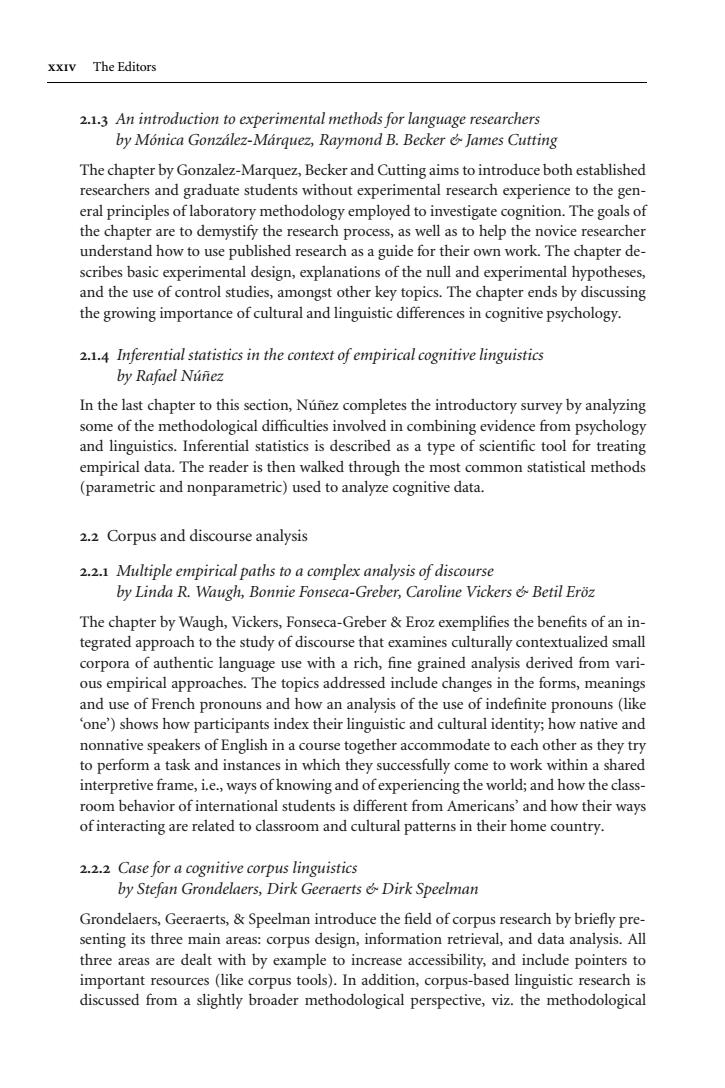正在加载图片...

XXIV The Editors 2.1.3 An introduction to experimental methods for language researchers by Monica Gonzdlez-Marquez,Raymond B.Becker James Cutting The chapter by Gonzalez-Marquez,Becker and Cutting aims to introduce both established researchers and graduate students without experimental research experience to the gen- eral principles of laboratory methodology employed to investigate cognition.The goals of the chapter are to demystify the research process,as well as to help the novice researcher understand how to use published research as a guide for their own work.The chapter de- scribes basic experimental design,explanations of the null and experimental hypotheses, and the use of control studies,amongst other key topics.The chapter ends by discussing the growing importance of cultural and linguistic differences in cognitive psychology. 2.1.4 Inferential statistics in the context of empirical cognitive linguistics by Rafael Nunez In the last chapter to this section,Nunez completes the introductory survey by analyzing some of the methodological difficulties involved in combining evidence from psychology and linguistics.Inferential statistics is described as a type of scientific tool for treating empirical data.The reader is then walked through the most common statistical methods (parametric and nonparametric)used to analyze cognitive data. 2.2 Corpus and discourse analysis 2.2.1 Multiple empirical paths to a complex analysis of discourse by Linda R.Waugh,Bonnie Fonseca-Greber,Caroline Vickers Betil Eroz The chapter by Waugh,Vickers,Fonseca-Greber Eroz exemplifies the benefits of an in- tegrated approach to the study of discourse that examines culturally contextualized small corpora of authentic language use with a rich,fine grained analysis derived from vari- ous empirical approaches.The topics addressed include changes in the forms,meanings and use of French pronouns and how an analysis of the use of indefinite pronouns(like one')shows how participants index their linguistic and cultural identity;how native and nonnative speakers of English in a course together accommodate to each other as they try to perform a task and instances in which they successfully come to work within a shared interpretive frame,i.e.,ways of knowing and of experiencing the world;and how the class- room behavior of international students is different from Americans'and how their ways of interacting are related to classroom and cultural patterns in their home country. 2.2.2 Case for a cognitive corpus linguistics by Stefan Grondelaers,Dirk Geeraerts Dirk Speelman Grondelaers,Geeraerts,Speelman introduce the field of corpus research by briefly pre- senting its three main areas:corpus design,information retrieval,and data analysis.All three areas are dealt with by example to increase accessibility,and include pointers to important resources(like corpus tools).In addition,corpus-based linguistic research is discussed from a slightly broader methodological perspective,viz.the methodologicalJB[v.20020404] Prn:12/04/2007; 9:53 F: HCP18IN.tex / p.3 (187-242) The Editors .. An introduction to experimental methods for language researchers by Mónica González-Márquez, Raymond B. Becker & James Cutting The chapter by Gonzalez-Marquez, Becker and Cutting aims to introduce both established researchers and graduate students without experimental research experience to the general principles of laboratory methodology employed to investigate cognition. The goals of the chapter are to demystify the research process, as well as to help the novice researcher understand how to use published research as a guide for their own work. The chapter describes basic experimental design, explanations of the null and experimental hypotheses, and the use of control studies, amongst other key topics. The chapter ends by discussing the growing importance of cultural and linguistic differences in cognitive psychology. .. Inferential statistics in the context of empirical cognitive linguistics by Rafael Núñez In the last chapter to this section, Núñez completes the introductory survey by analyzing some of the methodological difficulties involved in combining evidence from psychology and linguistics. Inferential statistics is described as a type of scientific tool for treating empirical data. The reader is then walked through the most common statistical methods (parametric and nonparametric) used to analyze cognitive data. . Corpus and discourse analysis .. Multiple empirical paths to a complex analysis of discourse by Linda R. Waugh, Bonnie Fonseca-Greber, Caroline Vickers & Betil Eröz The chapter by Waugh, Vickers, Fonseca-Greber & Eroz exemplifies the benefits of an integrated approach to the study of discourse that examines culturally contextualized small corpora of authentic language use with a rich, fine grained analysis derived from various empirical approaches. The topics addressed include changes in the forms, meanings and use of French pronouns and how an analysis of the use of indefinite pronouns (like ‘one’) shows how participants index their linguistic and cultural identity; how native and nonnative speakers of English in a course together accommodate to each other as they try to perform a task and instances in which they successfully come to work within a shared interpretive frame, i.e., ways of knowing and of experiencing the world; and how the classroom behavior of international students is different from Americans’ and how their ways of interacting are related to classroom and cultural patterns in their home country. .. Case for a cognitive corpus linguistics by Stefan Grondelaers, Dirk Geeraerts & Dirk Speelman Grondelaers, Geeraerts, & Speelman introduce the field of corpus research by briefly presenting its three main areas: corpus design, information retrieval, and data analysis. All three areas are dealt with by example to increase accessibility, and include pointers to important resources (like corpus tools). In addition, corpus-based linguistic research is discussed from a slightly broader methodological perspective, viz. the methodological